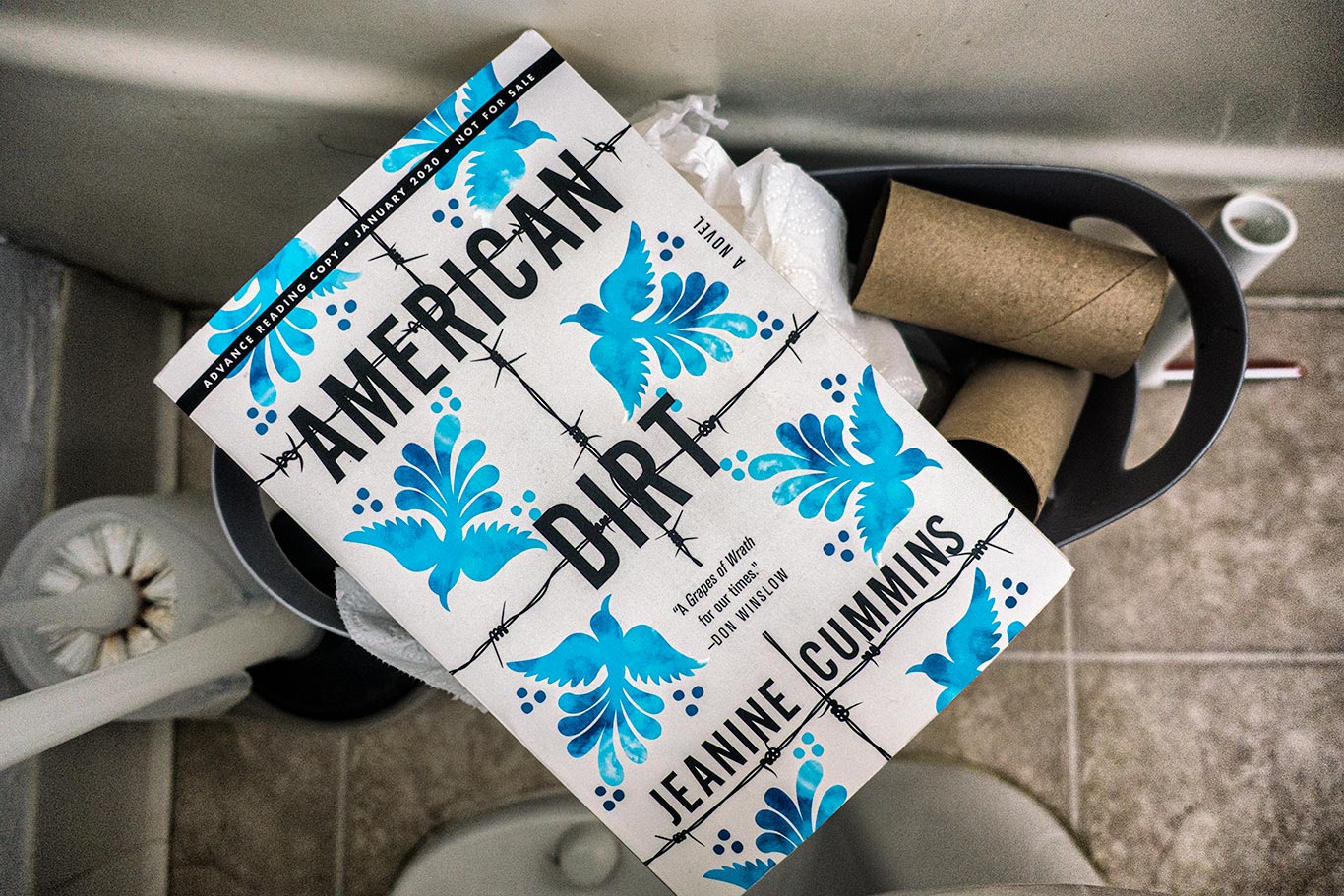Contrived: adj.
Deliberately created rather than arising naturally or spontaneously.
Created or arranged in a way that seems artificial and unrealistic.
This adjective screamed in my head when I kept reading further and further into chapter 10 of the book, American Dirt. Full disclosure: I was assigned to review this chapter, even though I’m not a professional writer. Then again, I was told, I probably couldn’t do any worse than JC, the author of this book so I said, F it. I will take one for the team. I hope to one day recover my brain cells after reading this crappy book again.
The chapter starts after Lydia and her son are dropped off in Mexico City by the missionaries who rescue them, when she starts going on the run from the cartel dudes. Then at the airport, she is trying to figure out what flight to take to a border city in Mexico: Tijuana, Nogales, Ciudad Juarez, Nuevo Laredo, etc. I should’ve remembered better, what a drivel of a book AD is, when I read the following sentence: “From any of those cities you can smell the fresh-baked pies on the windowsills of el norte.” I laughed out loud! So white! I kept re-reading that sentence since I had read the book the first time in a rage and had overlooked these particular words. It was just one of many glaring examples in just this one chapter about how mediocre the writing really is. What Mexican woman is going to say that?! Sounds like Lydia watched too many reruns of Little House on the Prairie or The Waltons. You’re going to tell readers that a middle class, educated, Mexican woman, would have such an idealistic picture of the US in the 21st century? I understand Lydia is an “Anglophile,” but is she also an uptight Mormon prairie woman? No mames, guey.
Another detail regarding the italicized words in Spanish that bugged the crap out of me: I know this book is for an Anglo monolingual audience, but I wondered what’s with all the unnecessary italicized Spanish words JC uses? Did she want to make it look like she was all in the know about the Spanish language? Was she trying to imitate Latina/o/x, Chicana/o writers in the way many write, code switching effortlessly? Or was it a secret drinking game where every time an italicized Spanish word is used, Anglo readers Google it and drink tequila and think they’re learning Spanish and learning to “empathize” with migrants? Eye roll in Spanish.
Then in the section, where Lydia and her son Luca, are trying to book the flight that will get them closer to the USA, JC switches to the voice of the 8 year old by writing, “Mami interrupts his thoughts…” or “Mami bites her lip” and I wondered why an editor didn’t see how contrived this section sounds. Why not be simple about it and keep writing in the third person instead of making it sound so goddamn stupid? I know it’s a “romantic thriller,” but good God, couldn’t anyone in the editorial department read the ridiculous prose? More screaming in my head kept happening: contrived, contrived, contrived. Am surprised I was reading this far without having a stroke because my eyes were rolling so hard to the back of my head.
A main plot point that propels the character’s migration journey is due to the fact that Lydia and Luca can’t book a flight to the US because she doesn’t have a copy of her son’s birth certificate. Then to complicate matters, she goes to the Oficina Central del Registro Civil (eye roll) to request a copy and is denied because she has to go back to Acapulco to order it.
Many people have pointed out that it’s ridiculous that the character at this point in the book, decides that her only option is to ride La Bestia, the notorious train that is used by migrants to shorten their journeys throughout Mexico. I asked myself the same question. Why would JC decide to make it a crucial reason that Lydia could see no way out other than to make the perilous journey in the most dangerous way imaginable?
I did a quick Google search on how to order a birth certificate in Mexico, and guess what? Many states have joined the 21st century and a person can order them online! The list of Mexican states where this service is available is as follows: Aguascalientes, Baja California, Baja California Sur, Campeche, Chiapas, Chihuahua, Ciudad de México, Coahuila, Colima, Durango, Estado de México, Guanajuato, Guerrero, Hidalgo, Jalisco, Nayarit, Nuevo León, Morelos, Michoacán de Ocampo, Oaxaca, Puebla, Querétaro, Quintana Roo, San Luis Potosí, Sinaloa, Sonora, Tabasco, Tamaulipas, Tlaxcala, Veracruz, Yucatán y Zacatecas.
It took me less than five minutes to find out this information. I mention this as well because JC devotes a good amount of time in the chapter to the fact that Lydia and Luca spend time in the library. It has internet which Lydia uses to see videos on YouTube of La Bestia. Did it ever occur to her to do a search about obtaining a birth certificate online? She could have ordered it online and printed it right then and there. Problem solved. This plot hole is as big as my head. Contrived to the
Nth Degree. No mames.
As I finish writing this review, I reflect on the times I’ve been at detention centers, to advocate for migrants, and I feel unimaginable rage that this book is being
sold as trying to be an ally to migrants all the while using their pain for monetary gain of the author and the publisher. Trust the writers that sounded the alarm about this awful book. They know of what they speak. Instead of buying it, donate money to organizations helping to free migrants who are really suffering because of our unjust immigration laws. There is nothing contrived about their pain.
#DignidadLiteraria

